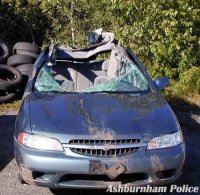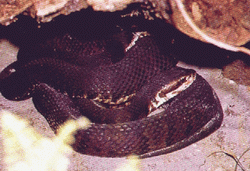Five of America's Most Dangerous Wild Animals - How to Beware!
by SixWise.com
Seeing a wild animal is like getting a glimpse into a world that we don't
always get to see anymore, especially for those of us who live in concrete-filled
urban areas. It's exciting and you may even be tempted to go in for a
closer look, but wild animals are, by their very nature, wild. That means
they can be dangerous too.
Take the hippopotamus. In Kenya, a 50-year-old woman was trampled to
death by one earlier this month. She was staying at a popular resort and
was with 12 other tourists when the hippo attacked. "The hippo attacked
the woman, flipping her into the air before tossing her on the ground
and trampling her," said Simon Kiragu, the regional police chief.
|

This car was involved in an accident with a moose.
|
Fortunately, in the United States we don't have to worry about hippos.
But there are a host of other wild animals that can pose risks. As spring
and summer approach, the key is knowing how to avoid those risks, and
how to respond should you ever find yourself threatened. Here are five
of the most common and dangerous wild animals in the U.S. and some tips
worth remembering.
Moose
"People may not be aware of how aggressive moose can be in the wild,
especially with new-born calves," said Kevin Frey, a grizzly bear
management specialist with Montana Fish, Wildlife and Parks.
Moose are large, unpredictable and easily surprised, so you should keep
your distance if possible. In the event you're cornered by an aggressive
moose, Game Warden Kevin Nichols says climbing a tree or getting behind
a tree or large rock is a good idea, or, if that's not an option, backing
up slowly while keeping your eyes on the animal-but not making eye contact
(this could be construed as a challenge, and you'll likely lose that challenge.)
Another danger? Moose stepping out onto roadways. Since moose have no
predators, they may not be aware of the dangers that cars, trucks and
other vehicles pose, but a car that hits a moose can easily be totaled
(and the moose will likely be killed).
Grizzly Bears
Though sightings of grizzly bears (or brown bears) are not too common,
these huge animals are unpredictable and at times ferocious. They're considered
the most dangerous of all bears, and can easily injure and kill humans.
Grizzlies are especially dangerous when they're:
-
With their cubs
-
Surprised
-
Approached while feeding, hungry, breeding or injured
-
Conditioned to human foods
If you live or are visiting a region known to have bears, never leave
food unattended or in areas that the bears can access.
If a grizzly bear approaches you, stay still (they can outrun humans
and climb trees). If the bear attacks, lie face down on your stomach and
play dead.
Use similar caution with all types of bears. On March 18, 2005 in New
Jersey, a bear climbed through two rows of fencing and killed a 250 pound
miniature horse. It then carried the horse back through the two rows of
(electrical!) fence and up a hill. Moral of the story: don't mess with
bears.
|

Raccoons may look cute and cuddly, but more people are treated
from rabies bites from raccoons than from bats
|
Raccoons
Raccoons can carry rabies, a viral illness that attacks the brain and
results in death unless treatment is given right away. The virus is transmitted
in the saliva of rabid animals, so raccoons are not the only threat, but
they are a more common carrier.
And, raccoons are everywhere. One undergraduate student at the University
of Rochester in New York was bitten while on a library balcony, for instance,
prompting school officials to release a "wildlife alert."
Though most rabies fatalities stem from bat bites, many more people are
treated for rabies from raccoon bites in the United States. Since the
mid-1970s, a new strain of raccoon rabies has been spreading across the
eastern United States, and it shows no signs of stopping-some are even
calling it a "re-emerging public health threat."
To avoid the threat of raccoons requires common sense. Keep all trash
that ends up outdoors and tightly closed containers, and make sure to
leave nothing that raccoons can eat outside in the area of your home.
If you are picnicking or camping, don't leave coolers outside - raccoons
are savvy and quickly learn how to unlatch them. NEVER approach a raccoon.
Finally, if your home is "infested" with a raccoon or raccoons,
do not try to take the matter into your own hands - call your local animal
control for assistance.
|

If You're in an Area With Poisonous Snakes ...
Here's what you should do, according to the U.S. Army (plus a few
snake facts):
-
Walk carefully and watch where you step.
-
Look closely when picking fruit or moving around water.
-
Do not tease or harass snakes.
-
Use sticks to turn logs and rocks.
-
Wear proper footgear, particularly at night.
-
Carefully check bedding, shelter and clothing.
-
Be calm when you encounter serpents. Snakes cannot hear and
you can occasionally surprise them when they are sleeping or
sunning. Normally, they will flee if given the opportunity.
-
Although it is not common, warm, sleeping human bodies occasionally
attract snakes.
|
Poisonous Snakes
The United States is home to several poisonous snakes, including:
-
American Copperhead
-
Bushmaster
-
Coral snake
-
Cottonmouth
-
Fer-de-lance
-
Rattlesnake
Snakes will typically flee if a person approaches them, but in the event
that they're startled (an easy thing to do since snakes are often camouflaged
in their environment) they may become aggressive and attack. They may
also attack if they feel cornered or are guarding a nest.
Fortunately for us Americans, there are no monocled cobras around (they're
so poisonous that even one bite can kill a person), but the occupants
of a Swedish apartment building weren't so lucky. Just this month, a man
who was keeping three of the cobras as pets lost one during a move, and
all 18 families in the building had to be evacuated until the snake was
captured.
Brown Recluse Spider
Commonly called the fiddleback spider or violin spider because of the
violin-shaped markings on its back, the brown recluse spider likes to
hide in dark places. Their bites are rarely fatal, but they can cause
deep wounds that take a long time to heal. In severe reactions, the venom
can cause excessive tissue degeneration around the wound site and even
lead to amputation.
Young children, the elderly and those who are ill are most at risk from
the bites. Preventing spider bites entirely may be altogether impossible,
but Susan C. Jones, Ph.D., assistant professor of entomology at Ohio State
University, suggests these tips to lessen your risk of being bitten:
-
Shake out clothing and shoes before getting dressed.
-
Inspect bedding and towels before use.
-
Wear gloves when handling firewood, lumber, and rocks (be sure to
inspect the gloves for spiders before putting them on).
-
Remove bedskirts and storage boxes from underneath beds. Move the
bed away from the wall.
- Exercise care when handling cardboard boxes (recluse spiders often
are found in the space under folded cardboard flaps).
Recommended Reading
Hantavirus:
The Little Mouse in Your House Could Be Deadly!
That
Little Mouse in Your House is Even MORE Dangerous Than We Thought!
Lice:
A Surprisingly Widespread Problem & the Shockingly Dangerous Conventional
"Solutions"
Sources
ESPN
Outdoors March 3, 2005
BaseGear:
U.S. Army Field Manual
Montana
State University
Mass
Wildlife
Moose
Warning
University
of Rochester
Forecasting
the Path of a Raccoon Rabies Epidemic
Weird
News
Ohio
State University